SWLAW Blog | Dean's Fellow Digest
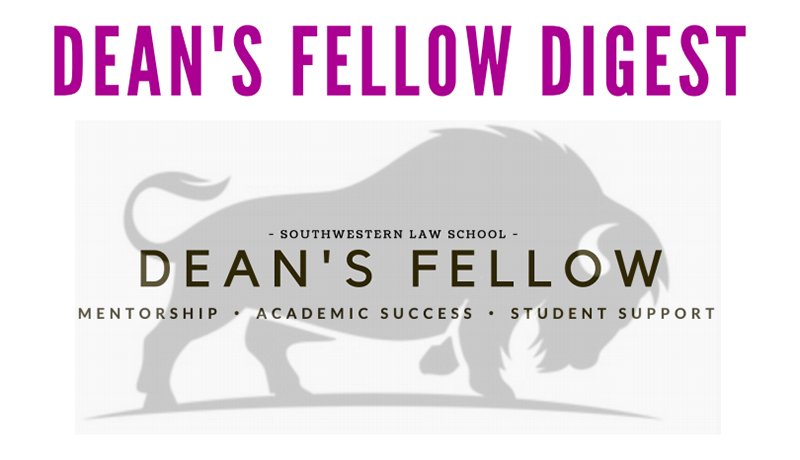
April 16, 2021
Dean's Fellow Digest Issue #27 - Remote & Open Book Exam Strategies: One Year in Review
Issue: 2021-4-16
Dean's Fellows consistently strive to support students in realizing their full academic potential, leading ultimately to success on the bar exam and in the workplace. To support all Southwestern students in this goal, the Dean's Fellows created this Digest as a way to check-in at critical times throughout the semester with helpful tips, strategies, and encouragement.
IN THIS ISSUE:
- Remote & Open Book Exam Strategies: One Year in Review
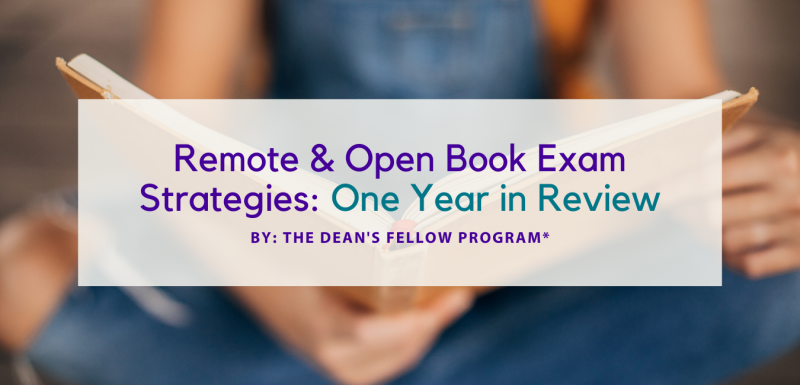
How do you set yourself up for success leading up to the exam?
 Create concise “attack plan” outlines. I had a long outline during one of my exams, and I realized on exam day that it takes too much time to flip pages during the exam, even using tabbed pages. I encourage you to create a succinct attack sheet to maximize outline use on the exam itself.
Create concise “attack plan” outlines. I had a long outline during one of my exams, and I realized on exam day that it takes too much time to flip pages during the exam, even using tabbed pages. I encourage you to create a succinct attack sheet to maximize outline use on the exam itself.
Practice, practice, practice. It is so important to complete the practice exams released by professors because that helps navigate the issues and spot them easily during the exam (professors generally do not change their exam writing styles). With practice, some rules come naturally to you without needing to look at your outline. In other words, the process of exam writing becomes a habit.
Take practice exams at the same time of day as the scheduled final and repeat the same routine. This helps with focus and energy.
Take the Examplify mock exams. I made the mistake of not taking one on my main computer before the exam, and I was stuck during the exam trying to type in a small window—without knowing how to expand that window. If I had done more practice directly on Examplify, that would have helped me type faster and cover all the points that I wanted to cover in that limited amount of time.
- Elena Cordonean
 Printing out your outline in advance is key. Some prefer an attack sheet in place of a table of contents. The attack sheet will contain only the topic of each issue and the main elements in one or two words. This should be limited to one or two pages at most. The benefit is, although you have your full outline ready to reference, if you know the content well enough, you refer quickly to the attack sheet for a quick guide.
Printing out your outline in advance is key. Some prefer an attack sheet in place of a table of contents. The attack sheet will contain only the topic of each issue and the main elements in one or two words. This should be limited to one or two pages at most. The benefit is, although you have your full outline ready to reference, if you know the content well enough, you refer quickly to the attack sheet for a quick guide.
This can also act as an issues checklist for each essay on the final exam. For example, print out as many copies as you expect there to be essays on the final. That way, for each essay, as you read through the facts, a checkmark next to any issue you want to discuss. When you start typing, you already know what you want to talk about.
- Lilian Zohrab
What are some strategies for using your outline when writing an open book exam?
 Always have clear, concise rule statements written the way you will be writing them on the exam. Not only does this save you time, but it makes your life easier come exam time and it accounts for easy points. Having your rule statements prepared the way you will be writing them into your exam has been so helpful for me. All I need to do is look down at my outline and type.
Always have clear, concise rule statements written the way you will be writing them on the exam. Not only does this save you time, but it makes your life easier come exam time and it accounts for easy points. Having your rule statements prepared the way you will be writing them into your exam has been so helpful for me. All I need to do is look down at my outline and type.
Color-code your outline to include counterarguments for issues. I always use red or another bold color when including counterarguments or exceptions to certain rules. This helps me catch them easily and ensures that I won't miss any counterarguments or exceptions to rules.
- Andy De La Cruz
 Not only is tabbing your outline a good idea, highlight the main topics so that your eyes divert straight to what you're looking for at that moment. Highlight a single word or two. For an added step, with a lighter highlighter color, go in and highlight keywords for elements required. This makes it easier to find things faster. Limit the use of highlighter colors so you don't highlight the entire outline.
Not only is tabbing your outline a good idea, highlight the main topics so that your eyes divert straight to what you're looking for at that moment. Highlight a single word or two. For an added step, with a lighter highlighter color, go in and highlight keywords for elements required. This makes it easier to find things faster. Limit the use of highlighter colors so you don't highlight the entire outline.
- Lilian Zohrab
 Memorize the rules even if you have the rule in your outline. I wasted a lot of time typing the rule from my outline to my computer. It generally takes longer to look at the rule, type it out, and then continue doing that for all the rules. I think people are getting too comfortable, myself included, with looking at the outline and not really understanding and memorizing the rules. We all have to remember that the bar is closed book. This is the time to start memorizing the rules.
Memorize the rules even if you have the rule in your outline. I wasted a lot of time typing the rule from my outline to my computer. It generally takes longer to look at the rule, type it out, and then continue doing that for all the rules. I think people are getting too comfortable, myself included, with looking at the outline and not really understanding and memorizing the rules. We all have to remember that the bar is closed book. This is the time to start memorizing the rules.
- Katherine Vazquez
What are some tips for taking your exam in a remote setting?
 Take short breaks in between issues or questions. I try to take short, 60-second breathers after finishing an entire essay question. This helps me prevent stress build-up and it feels good to breathe and re-center myself every so often. I also do this with multiple choice. Every 10 questions or so I will pause for 30 seconds and take some deep breaths.
Take short breaks in between issues or questions. I try to take short, 60-second breathers after finishing an entire essay question. This helps me prevent stress build-up and it feels good to breathe and re-center myself every so often. I also do this with multiple choice. Every 10 questions or so I will pause for 30 seconds and take some deep breaths.
Make sure everyone in your living space knows you are taking a final exam. I always make an announcement the day before and the day of (5 minutes before the final exam start time) to my parents and sister to let them know I am taking a final exam and the duration of the final, so they know to keep the noise down during this time.
- Andy De La Cruz
 Take advantage of the 10 minutes you get to print your essays out before the start of the essay. Use that time to create an issues checklist while reading through the facts. When time odically begins, you'll be able to jump right into outlining your essay response.
Take advantage of the 10 minutes you get to print your essays out before the start of the essay. Use that time to create an issues checklist while reading through the facts. When time odically begins, you'll be able to jump right into outlining your essay response.
- Lilian Zohrab
How do you keep the end goal in mind?
 Study for the exam as if it were closed note. In the short term, taking an exam while relying on outlines, notes, etc. requires more time that you likely do not have. In the long run, the less you digest, understand, memorize now, the more you will have to later when prepping for the bar. I have noticed my recall for my 1L, closed-book subjects are much better than even my recall for some of my open-book subjects last semester.
Study for the exam as if it were closed note. In the short term, taking an exam while relying on outlines, notes, etc. requires more time that you likely do not have. In the long run, the less you digest, understand, memorize now, the more you will have to later when prepping for the bar. I have noticed my recall for my 1L, closed-book subjects are much better than even my recall for some of my open-book subjects last semester.
- Chloe Graham
 Prepare like you are taking the exam in real life under closed book conditions. It's good for memory recall when you get into bar prep and makes one less step for you in that process.
Prepare like you are taking the exam in real life under closed book conditions. It's good for memory recall when you get into bar prep and makes one less step for you in that process.
- Haley Pollock
 Practice for game day. Time constraints are not friendly to a lack of preparation or frequent references to outlines and texts. Knowledge is critical to move swiftly and accurately in response to the call of the question, and so is practicing with the outline as you would use it during exams. Develop your system so you find what works best for you now, so you can focus on acquiring knowledge, not wasting time looking for it.
Practice for game day. Time constraints are not friendly to a lack of preparation or frequent references to outlines and texts. Knowledge is critical to move swiftly and accurately in response to the call of the question, and so is practicing with the outline as you would use it during exams. Develop your system so you find what works best for you now, so you can focus on acquiring knowledge, not wasting time looking for it.
- Dean Matsuyama
*About the Authors:
ELENA CORDONEAN
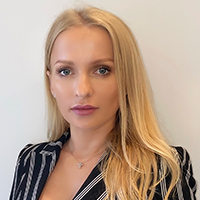 Elena is a 2L evening student who holds two master’s degrees obtained in Europe before entering law school. At Southwestern, she intends to focus her academic coursework on criminal, international, and environmental law. She is fluent in five languages and is interested in building a strong educational background that would help her pursue a career at an intergovernmental organization. While attending Southwestern, Elena works as a law clerk for a personal injury law firm where she is involved in all aspects of the pre-litigation and litigation process.
Elena is a 2L evening student who holds two master’s degrees obtained in Europe before entering law school. At Southwestern, she intends to focus her academic coursework on criminal, international, and environmental law. She is fluent in five languages and is interested in building a strong educational background that would help her pursue a career at an intergovernmental organization. While attending Southwestern, Elena works as a law clerk for a personal injury law firm where she is involved in all aspects of the pre-litigation and litigation process.
Elena believes that the study of law, while providing a lifetime of opportunities, invaluable connections, and the ability to attain the highest degree of self-realization, is not without challenge. She is excited to help the incoming evening students to succeed because it is not about the individual but rather the collaboration of skills and experience that will ensure success and uphold the values that are true to all of us.
ANDY DE LA CRUZ
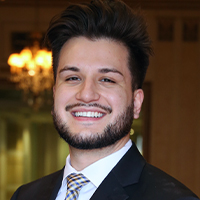 Andy is a Traditional Day 2L student in Southwestern’s Traditional Day Program. Andy graduated from UCLA in 2017 with a B.A. in Political Science. After graduating from UCLA, Andy worked for the non-profit organization Neighborhood Legal Services of Los Angeles County. As a paralegal at Neighborhood Legal Services, he helped low-income individuals and families in the areas of healthcare and housing law.
Andy is a Traditional Day 2L student in Southwestern’s Traditional Day Program. Andy graduated from UCLA in 2017 with a B.A. in Political Science. After graduating from UCLA, Andy worked for the non-profit organization Neighborhood Legal Services of Los Angeles County. As a paralegal at Neighborhood Legal Services, he helped low-income individuals and families in the areas of healthcare and housing law.
At Southwestern, Andy is also a Peer Mentor, the treasurer for the Latino Law Students Association (LLSA), the Westlaw Student Representative, and a staffer on the Southwestern Law Review. He also externed for Chief Judge Philip S. Gutierrez during his 1L summer through the Mexican American Bar Association’s Federal Judicial Externship Program. Andy hopes to pursue a summer position at a big law firm during his 2L summer. He is currently interested in the areas of intellectual property, entertainment, and sports law. Andy credits his success at Southwestern to his mentors, peers, and the wonderful staff and school community that provide him continued support.
When Andy isn’t studying or reading, he loves watching sports, collecting sneakers, and is a huge Lakers fan. Please do not hesitate to reach out with any questions for Andy or to schedule an appointment.
CHLOE GRAHAM
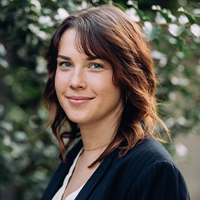 Chloe is a Traditional Day 2L student who graduated from the University of California, Berkeley in 2018 with a B.A. in Political Science. Prior to attending Southwestern, Chloe worked as a Staff Assistant for the House of Representative both on Capitol Hill in Washington D.C., and in her hometown of Bakersfield, California. She spent her summer clerking at a medium-sized civil defense litigation firm where she was able to gain real-world experience working on both medical malpractice and employment law cases.
Chloe is a Traditional Day 2L student who graduated from the University of California, Berkeley in 2018 with a B.A. in Political Science. Prior to attending Southwestern, Chloe worked as a Staff Assistant for the House of Representative both on Capitol Hill in Washington D.C., and in her hometown of Bakersfield, California. She spent her summer clerking at a medium-sized civil defense litigation firm where she was able to gain real-world experience working on both medical malpractice and employment law cases.
Chloe is a member of the International Law Journal, a Teaching Assistant, and a part of the Children’s Rights Clinic. In 2019, she became one of the youngest certified Court Appointed Special Advocates in Kern County, and has a passion for child advocacy through adoption. She loves connecting with people and understands how difficult the transition to law school can be, so please reach out to her!
DEAN MATSUYAMA
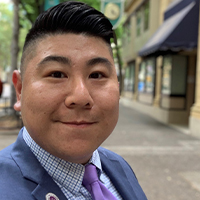 Dean is a 2L Evening student seeking to practice in public interest law. He holds undergraduate degrees in Political Science and Criminology from UC Irvine and an MPA from CSUN. For the last seven years, he has been a paralegal for the Children's Law Center of California which serves as court-appointed minor's counsel in juvenile dependency cases.
Dean is a 2L Evening student seeking to practice in public interest law. He holds undergraduate degrees in Political Science and Criminology from UC Irvine and an MPA from CSUN. For the last seven years, he has been a paralegal for the Children's Law Center of California which serves as court-appointed minor's counsel in juvenile dependency cases.
A Dean's Merit Scholar and CALI Award recipient, Dean hopes he can help you thrive at Southwestern so you can get the most out of your law school experience. He looks forward to serving the Southwestern community and cannot wait to see your success. Please contact him if you have any questions or concerns.
HALEY POLLOCK
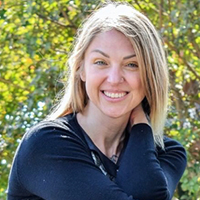 Haley Pollock is a Traditional Day 3L student with a concentration in public interest law. This summer, Haley worked as a judicial extern in the Hearings Unit at the Equal Employment Opportunity Commission. There, she conducted extensive legal research and wrote about employment discrimination violative of Title VII of the Civil Rights Act of 1964. Before attending law school, Haley was Chief Financial Officer to a trauma-informed drug rehabilitation center and Director of Operations for a post-production house.
Haley Pollock is a Traditional Day 3L student with a concentration in public interest law. This summer, Haley worked as a judicial extern in the Hearings Unit at the Equal Employment Opportunity Commission. There, she conducted extensive legal research and wrote about employment discrimination violative of Title VII of the Civil Rights Act of 1964. Before attending law school, Haley was Chief Financial Officer to a trauma-informed drug rehabilitation center and Director of Operations for a post-production house.
Haley sits on a regional council for NARAL where she promotes reproductive freedom policies by mobilizing support for priority bills by organizing phone banks, petition-signings, and letter-writing parties. She also serves as an elected committee member of the National Lawyers Guild Los Angeles Immigration Law Steering Committee She is a dedicated advocate of immigrant and workers’ rights, women and children’s rights, affordable housing, and other policy issues affecting residents of Los Angeles. Last year, Haley was a member of the law review and moot court honors programs. This year, she is the co-vice chair of National Lawyers Guild student association, the pro bono coordinator for the Homelessness Law Prevent Project, a senior writing fellow, and a returning Dean’s fellow. She looks forward to helping incoming students succeed in their studies.
LILIAN ZOHRAB
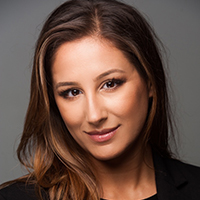 Lilian is a 2L Evening student who graduated from Cal State Fullerton with a B.A. in Sociology. She currently works full-time for the County of Los Angeles Human Resources Department and volunteers for the County of Los Angeles District Attorney’s Office. Lilian intends to complete a concentration in Criminal Law to advocate for victims of violence.
Lilian is a 2L Evening student who graduated from Cal State Fullerton with a B.A. in Sociology. She currently works full-time for the County of Los Angeles Human Resources Department and volunteers for the County of Los Angeles District Attorney’s Office. Lilian intends to complete a concentration in Criminal Law to advocate for victims of violence.
Lilian has worked full time throughout her academic career. She knows what it feels like to have a busy schedule and is excited to make herself available to help you work through yours, as well. Lilian looks forward to being a resource for you as you dive into your first year at Southwestern.
Southwestern Law School Dean's Fellows | Scheduling and Booking Website
Dean’s Fellows are upper-division students with strong academic skills who go through a rigorous application and training process. They are an integral part of the Academic Success and Bar Preparation Department. They are carefully selected based on their academic excellence and ability to teach other students best-practice study methods that will help them become acclimated to the study of law. Dean’s Fellows meet with students as academic mentors.
Please click HERE to make an appointment with a Dean's Fellow.